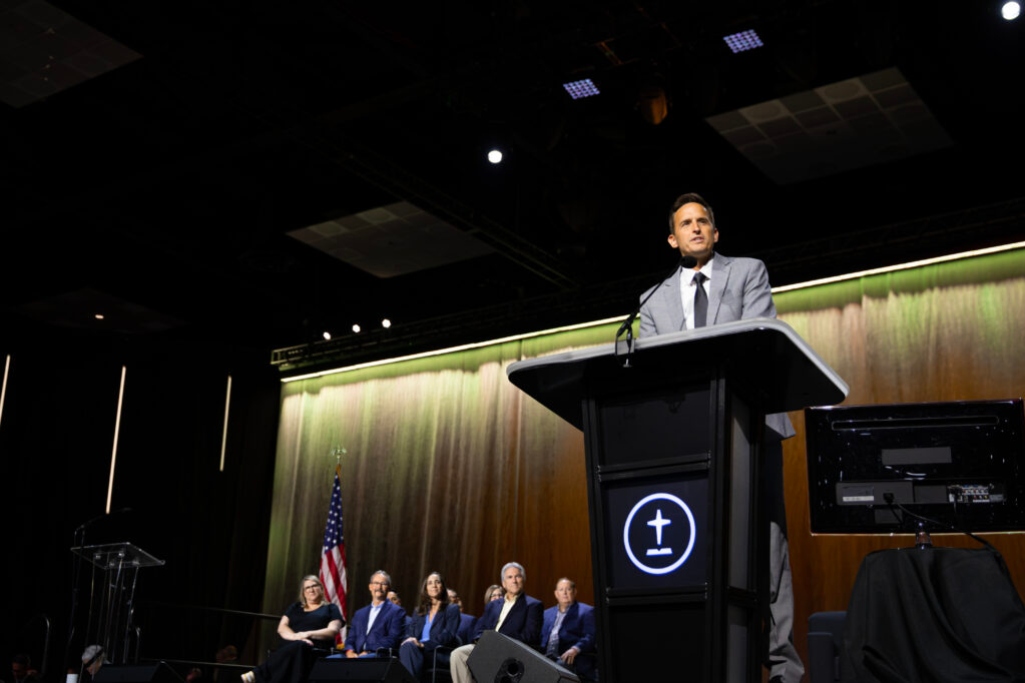
NASHVILLE (BP) — If Southern Baptist Convention (SBC) messengers ask a question following this year’s GuideStone Financial Resources report in Indianapolis, health insurance is likely to be the topic. Since 2019, messengers to the SBC annual meeting have twice asked GuideStone chief executives questions. Both times the inquiries focused on the rising costs of health insurance.
In response to a messenger question last year in New Orleans, GuideStone President Hance Dilbeck noted the difficulty of pastors’ health insurance.
“We all know that the medical system in general and insurance is a challenge,” he said. GuideStone “is working hard to be as creative and as flexible as possible.”
Health care experts echo Dilbeck about the trouble with America’s health care system. The system is a challenge, they say, and pastors tend to fall within the demographic that suffers most. But a few tricks can help pastors and churches reduce costs.
Rising costs
It’s not just pastors who feel the pinch of rising health care costs. Over the past 10 years, the average family health insurance premium has increased 47% while inflation has been just 30%, according to the Kaiser Family Foundation, an organization that compiles health care information.
Yet the U.S. health care system applies the greatest pinch to workers at the salary levels pastors often receive.
“The lowest-end corporate people” are suffering most, said Harold Roe, a health care benefits consultant in Nashville and co-founder of Employee Prosperity Partners, an organization that works with employers to increase employee wellness. “When you see premium numbers like I’m seeing on health plans recently, it’s just hard to see how” workers like pastors “can afford those types of premiums.”
Most Americans with incomes at or below the federal poverty level receive free health insurance through provision of federal and state law. Those with extremely high incomes pay only a small percentage of their earnings for health insurance. The challenge arises for those from 100%-400% of the poverty level — a range into which many pastors fall.
Americans in that income bracket are required to pay a percentage of their income in health insurance premiums for mid-level plans on the federal Affordable Care Act (ACA) exchange — often among the cheapest options for purchasing individual plans. (Until 2025, some people over 400% of the poverty level also qualify for subsidized insurance under the COVID-19-inspired American Rescue Plan.) The percentage each family is required to pay increases as their income increases, with a maximum of 8.5%, according to data from HealthInsurance.org.
The average full-time SBC senior pastor’s salary is $76,600, according to the most recent Church Compensation Survey published by GuideStone and Lifeway Christian Resources. For a family of three, that places pastors among the highest paying customers for mid-level ACA insurance plans — $543 per month at 8.5% of their income.
Plans offered through GuideStone seem to reflect the market trends, according to data from SBC Annuals. Since 2012, the average amount GuideStone plans have paid out in claims per Southern Baptist insured has grown from $7,058 annually to $10,843 annually, a 54% increase.
“Due to our size and expertise, GuideStone negotiates savings on behalf of our members and ministry partners,” GuideStone COO Chu Soh said. “Churches choose GuideStone thanks to the faith alignment, shared values, customer service and overall competitive pricing available. As health costs continue to rise, GuideStone serves as an advocate for our members with our understanding of the unique challenges facing the health care of ministers and churches.”
Pastors watching the trends may wonder if anything can be done to decrease their personal expenditures on health care. Yes, say industry experts.
Options for saving money
Selecting the right insurance plan is the first way to save money, Roe said. Consumers tend to seek insurance policies with low deductibles and high premiums. But generally, savings come through the opposite approach: buying insurance with high deductibles and low premiums, paired with a health savings account that enables tax-free spending on health care.
Roe cited as an example an employer he worked with recently. Employees could choose between a health plan with a $1,000 family deductible and a plan with a $6,000 family deductible. The high-deductible plan had a $10,000 annual out-of-pocket maximum for a family compared with a $3,000 maximum for the lower-deductible plan.
“The vast majority of the employees are enrolled in the [low-deductible] plan even though it would take $13,720 in claims or more for it to be superior financially to the high-deductible health plan,” Roe said. “We know statistically that less than 10% of the population in a given plan year will hit that level of claims, yet most people still opt for the low deductible and low out-of-pocket maximums because they have not been educated about health plan math and its particular variables.”
Another way to save money is for churches to offer their pastors a salary plus benefits rather than giving them a total compensation package to be divvied as the pastor chooses.
“This package approach to compensation is too simple and unnecessarily costly for pastors,” Soh said. “The reality is that it may cause the pastor to unnecessarily pay more in taxes, ultimately reducing his take-home pay. It also means that many pastors will forego important financial security options like health coverage, life insurance, disability and retirement savings to maximize take-home pay. A better approach, which is adopted by most secular employers regardless of size, is a salary-and-benefits approach through which the church allocates dollars for salary as well as dollars for benefits and expenses.”
Living Hope Baptist Church in Bowling Green, Kentucky, uses a salary-and-benefits approach for all its pastors. For health insurance, that means letting employees choose between deductibles of $1,000 and $2,500. Either way, the employee pays 13% of the premiums with the church paying the rest.
Offering attractive health insurance options can help churches build high-quality staffs, said Living Hope human resource manager Don Lancette, especially when church salaries lag behind those of secular employers.
“Our whole philosophy is to offer the best benefits we can for what we can afford,” he said. “Most churches don’t pay market for salaries. So one of the things we try to do to attract people is to keep the benefit costs for them down as much as we can compared to the secular market.”
Partnering with GuideStone to offer health insurance saved Living Hope money. Six years ago, the church faced a 30% premium increase with its former carrier, Lancette said. Switching to GuideStone led to four consecutive years with no increase, followed by an 11% increase.
Other churches apparently have made similar switches to GuideStone. Since 2012, GuideStone group plans have increased from 12,877 enrollees to 21,420. Group plans are available for churches with two or more enrolled employees. GuideStone personal plans have not been as popular, decreasing over the same period from 13,783 enrollees to 4,113.
Any church with 60 or more attendees can and should provide health insurance for its pastor, Lancette said. Smaller churches may need to send pastors to the ACA exchange to purchase insurance because their budgets cannot support a pastor’s salary plus benefits package.
The average church allocates 49.1% of budget to personnel, according to ChurchSalary.com, with half allocating between 40% and 60%. “I don’t know that deacons and elders really understand how much of a budget should go to personnel in a church,” Lancette said, noting Living Hope spends 52%. He urged churches below the norm to increase their personnel spending by enhancing health coverage for employees.
A final tool churches and pastors should consider utilizing is an independent health care broker. Often assisting at no cost to those seeking insurance, independent health care brokers help connect employers and individuals with insurance carriers. In many instances, the brokers are paid by the insurance carriers rather than the churches and pastors seeking insurance.
“When you leave someone who’s not an expert in employee benefits to fend for themself, they are either going to not find all the options, or they are going to find an option” that “may be the cheapest” but not provide adequate coverage, said Caleb Herndon, a benefits consultant with Benefits Blueprint Partners, a Tennessee benefits brokerage.
Pastors can find independent benefits consultants through the website of the National Association of Benefits and Insurance Professionals, Herndon said, or by Googling “employee benefits consultants near me.”
The road ahead is difficult when it comes to health insurance, Roe said. But creative thinking by pastors and churches can chart a manageable way forward.
“Press your benefits folks to think outside the box,” he said, “and to actually provide education to employees rather than just an enrollment meeting.”
(EDITOR’S NOTE – David Roach is a writer in Mobile, Alabama.)


